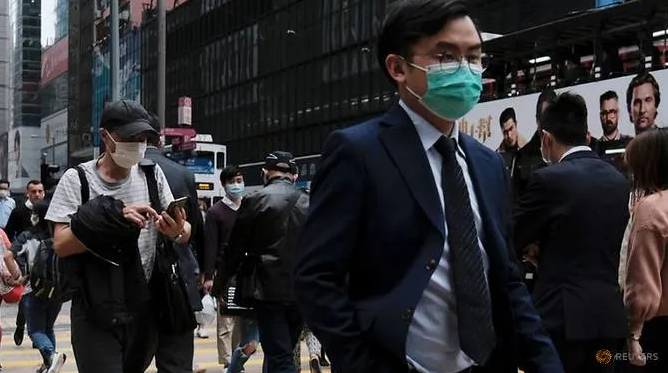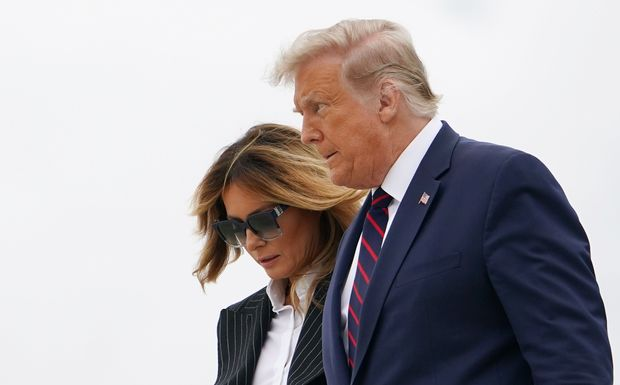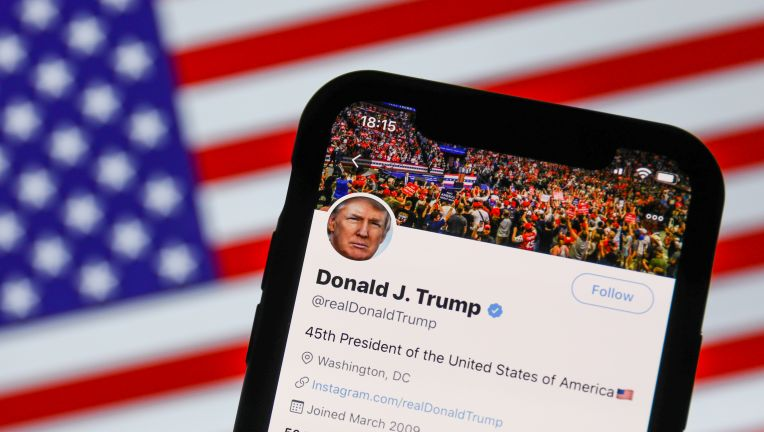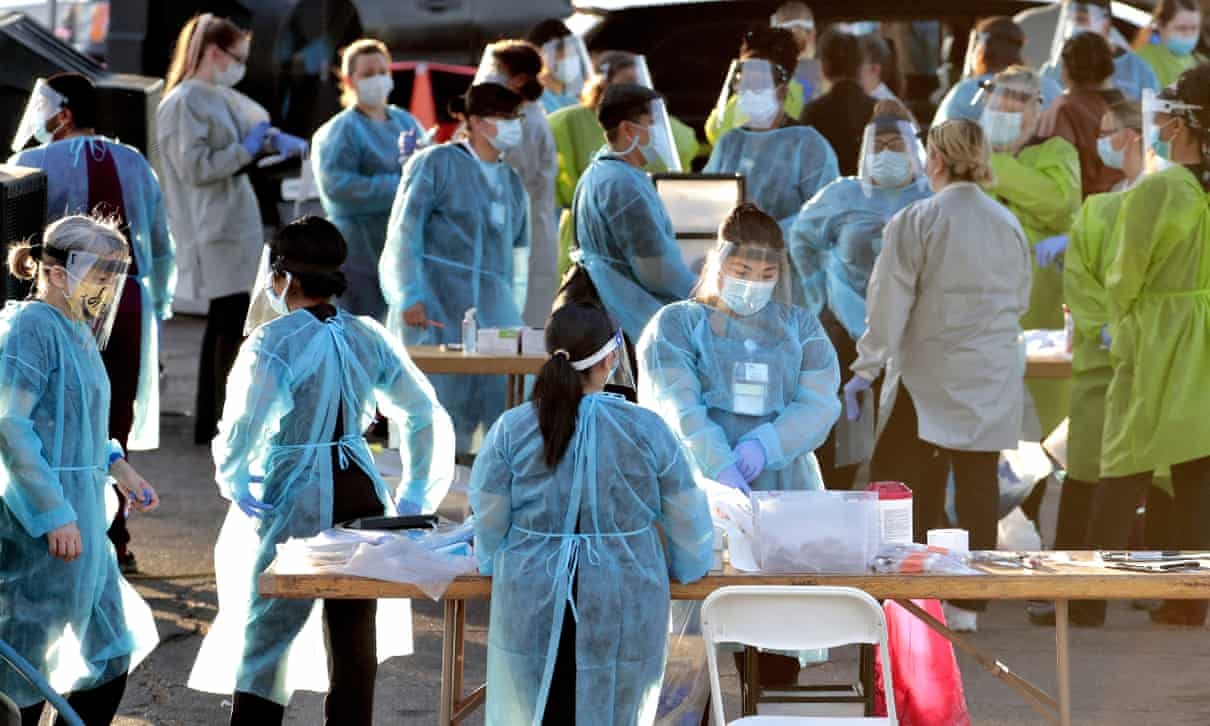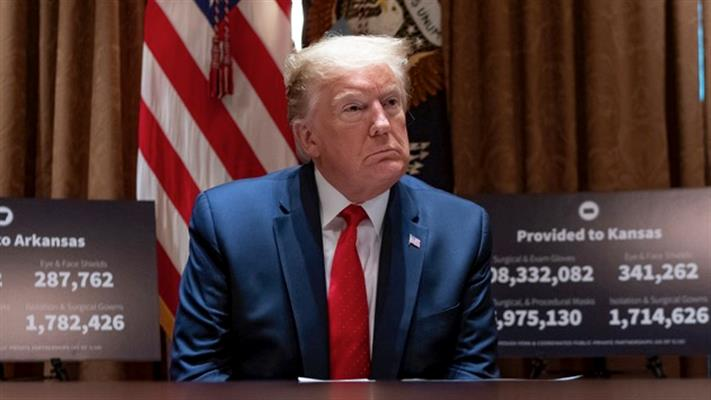Frofile, Biography of Fauci
Doctor Anthony Stephen Fauci, as on Wikipedia, born December 24, 1940, is an American physician and immunologist who has served as the director of the National Institute of Allergy and Infectious Diseases (NIAID) since 1984. Since January 2020, he has been one of the lead members of the Trump Administration's White House Coronavirus Task Force addressing the 2019–20 coronavirus pandemic in the United States. During the height of the pandemic, Fauci was widely seen to be one of the most trusted medical figures in the country.
Fauci is widely recognized as one of the world's leading experts on infectious diseases. As a physician with the National Institutes of Health (NIH), Fauci has served American public health in various capacities for over 50 years, and has been an advisor to every U.S. president since Ronald Reagan. He has made contributions to HIV/AIDS research and other immunodeficiencies, both as a scientist and as the head of the NIAID at the NIH.
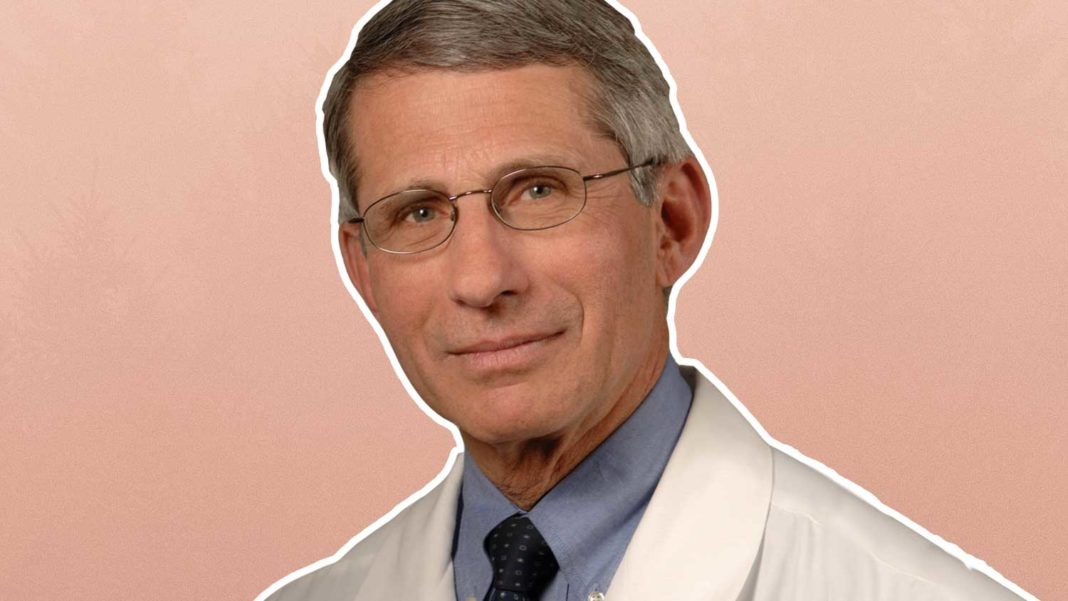 |
| Doctor Fauci (Photo: livekindly) |
Newyorker informed on April 10 that just before midnight on March 22nd, the President of the United States prepared to tweet. Millions of Americans, in the hope of safeguarding their health and fighting the rapidly escalating spread of covid-19, had already begun to follow the sober recommendation of Anthony S. Fauci, the country’s leading expert on infectious disease. Fauci had warned Americans to “hunker down significantly more than we as a country are doing.” But President Donald Trump disagreed. “we cannot let the cure be worse than the problem itself,” he tweeted.
Trump had seen enough of “social distancing.” In an election year, he was watching the stock market collapse, unemployment spike, and the national mood devolve into collective anxiety. “I would love to have the country opened up, and just rarin’ to go by Easter,” he said, on Fox News. “You’ll have packed churches all over our country. I think it’ll be a beautiful time.”
Trump’s Easter forecast came more than two months after the first U.S. case of covid-19 was identified, in Washington State, and more than a hundred days after the novel coronavirus emerged, first from bats and then from a live-animal market in the Chinese city of Wuhan. Every day, more people were falling sick and dying. Despite a catastrophic lack of testing capacity, it was clear that the virus had reached every corner of the nation. With the Easter holiday just a few weeks away, there was not a single public-health official in the United States who appeared to share the President’s rosy surmises.
Anthony Fauci certainly did not. At seventy-nine, Fauci has run the National Institute of Allergy and Infectious Diseases for thirty-six years, through six Administrations and a long procession of viral epidemics: H.I.V., sars, avian influenza, swine flu, Zika, and Ebola among them. As a member of the Administration’s coronavirus task force, Fauci seemed to believe that the government’s actions could be directed, even if the President’s pronouncements could not. At White House briefings, it has regularly fallen to Fauci to gently amend Trump’s absurdities, half-truths, and outright lies. No, there is no evidence that the malaria drug hydroxychloroquine will provide a “miracle” treatment to stave off the infection. No, there won’t be a vaccine for at least a year. When the President insisted for many weeks on denying the government’s inability to deliver test kits for the virus, Fauci, testifying before Congress, put the matter bluntly. “That’s a failing,” he said. “Let’s admit it.”
When Trump was not dismissing the severity of the crisis, he was blaming others for it: the Chinese, the Europeans, and, as always, Barack Obama. He blamed governors who were desperate for federal help and had been reduced to fighting one another for lifesaving ventilators. In one briefing, Governor Andrew Cuomo, of New York, said, “It’s like being on eBay with fifty other states, bidding on a ventilator.” Trump even accused hospital workers in New York City of pilfering surgical masks and other vital protective equipment that they needed to stay alive. “Are they going out the back door?” Trump wondered aloud.
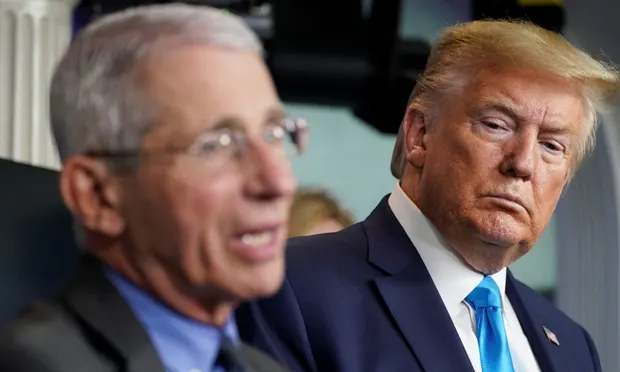 |
| Dr Anthony Fauci speaking as US President Donald Trump listens during the daily press briefing on the Coronavirus pandemic at the White House (Photo: AFP) |
As a reporter who writes mainly on science and public-health issues, I’ve known Fauci since the H.I.V./aids epidemic exploded, in the mid-eighties. He once explained to me that he has developed a method for dealing with political leaders in times of crisis: “I go to my favorite book of philosophy, ‘The Godfather,’ and say, ‘It’s nothing personal, it’s strictly business.’ ” He continued, “You just have a job to do. Even when somebody’s acting ridiculous, you can’t chide them for it. You’ve got to deal with them. Because if you don’t deal with them, then you’re out of the picture.”
Since his days of advising Ronald Reagan and George H. W. Bush, Fauci has maintained a simple credo: “You stay completely apolitical and non-ideological, and you stick to what it is that you do. I’m a scientist and I’m a physician. And that’s it.” He learned the value of candor early. “Some wise person who used to be in the White House, in the Nixon Administration, told me a very interesting dictum to live by,” he told me in 2016, during a public conversation we had at the fifty-year reunion of his medical-school class. “He said, ‘When you go into the White House, you should be prepared that that is the last time you will ever go in. Because if you go in saying, I’m going to tell somebody something they want to hear, then you’ve shot yourself in the foot.’ Now everybody knows I’m going to tell them exactly what’s the truth.”
Americans have come to rely on Fauci’s authoritative presence. Perhaps not since the Vietnam era, when Walter Cronkite, the avuncular anchor of the “CBS Evening News,” was routinely described as the most trusted man in America, has the country depended so completely on one person to deliver a daily dose of plain talk. In one national poll, released last Thursday, seventy-eight per cent of participants approved of Fauci’s performance. Only seven per cent disapproved.
On March 23rd, Fauci failed to appear at the daily briefing in the White House pressroom. Twitter promptly lost its mind. #NoFauci became a top trending topic, followed closely by #whereisFauci and #letTonyspeak. There was speculation that Trump, who is inclined to fire anyone who disagrees with him or, worse, garners some praise in the media, had lost patience with Fauci. As one of Fauci’s old friends told me, “This is a President who doesn’t give a shit about Fauci’s accomplishments, his history, or his learning. If anything, they’re negatives.”
The truth was less alarming. “I was tied up in a task-force meeting, and we were trying to work out some difficult policies,” Fauci said. “I have no trouble with the President. When I talk to him, he listens.” My experience with Fauci suggested that this last statement was perhaps a triumph of pragmatism over accuracy. His priority, as he’s made clear, is to do what is necessary to save lives. So I was not surprised to receive an e-mail from Fauci the following day, saying that he had been asked to refrain from participating in personal profiles. It seemed that it was one thing for him to talk about the news with reporters or even to chat on Instagram with Stephen Curry, the Golden State Warriors star. But focussing on himself, rather than on the President, was another thing entirely.
Fauci and Trump are about as odd a duo as American political life has ever produced. Both men are in their seventies. Both come from the outer boroughs of New York City. Both are direct, even blunt. But that’s where the resemblance ends. Fauci has always been a person of unusual discipline. Nearing eighty, he works about eighteen hours a day. Long ago, when his three children were young, he and his wife, Christine Grady, who runs the bioethics department at the National Institutes of Health, decided to maintain the sanctity of family dinners by starting them when he got home from the office, at around nine o’clock. For decades, Fauci has taken long lunchtime runs, but, during the crisis, he’s cut back his routine to power walking––and only on weekends. Fauci parses his words with care and believes, above all, in the power of facts and the efficacy of data.
The guardian said that Trump tweets prompt speculation he could fire Fauci. Fauci made the comments on CNN on Sunday morning. Trump reacted angrily, attacking the New York Times and retweeting a message that called for Fauci to be fired. Dr Anthony Fauci’s apparent confirmation of a damning report about the Trump administration’s response to the coronavirus outbreak prompted tweets by Donald Trump and a new round of speculation about whether the president will move to fire his top public health expert.
White House spokesman said president ‘is not firing Dr Fauci’ after Trump retweeted post calling for public health expert’s remova
But on Monday morning, sources did not indicate that Fauci, 79 and director of the National Institute of Allergy and Infectious Diseases since 1984, was in danger of losing his job.
Speculation continued regadless, prompting the White House spokesman Hogan Gidley to say in a statement: “This media chatter is ridiculous. President Trump is not firing Dr Fauci.”
Among Trump administration officials handling the pandemic, Fauci has emerged as the public face of competence. A regular presence beside Trump at White House briefings, he has been praised for walking a fine line, offering trustworthy information about the pandemic while not enraging or dramatically undercutting the president.
As a result of both threats and a wave of unwanted communications from admirers, Fauci’s security detail has been expanded. Elsewhere in the Trump administration, such a change in profile for a relatively minor official has often been a precursor to the president deciding to remove him or her from the building.
On Sunday, Fauci confirmed a New York Times report that said Trump administration officials recommended instituting social distancing in February, to hinder the coronavirus from spreading, but were rebuffed until mid-March.
Asked by CNN’s Jake Tapper if lives would have been saved had social distancing been implemented earlier, Fauci said: “I mean, obviously, if we had, right from the very beginning, shut everything down, it may have been a little bit different. But there was a lot of pushback about shutting things down back then.”
At his morning briefing in Albany, New York, Andrew Cuomo was asked about the issue. The governor of the worst-hit state, who had just announced a death toll of more than 10,000, applauded Fauci as an “extraordinary” asset in the fight against Covid-19.
“I think Dr Fauci is great,” Cuomo said. “I think Americans trust him.”
Of the possibility that Trump might fire Fauci, Cuomo added: “As crazy as things get in this world, I can’t imagine that would ever happen.”
In his statement, Gidley accused the media of “attempt to rewrite history”.
“It was Democrats and the media who ignored coronavirus choosing to focus on impeachment instead,” he said, “and when they finally did comment on the virus it was to attack President Trump for taking the bold decisive action to save American lives by cutting off travel and from China and from Europe.
“Dr Fauci has been and remains a trusted adviser to President Trump.”
Privately, Trump has expressed frustration with Fauci and many of the president’s supporters increasingly advocate that the doctor be fired. But Fauci himself has suggested his job is relatively safe.
Asked by Science magazine how he was managing not to get fired, he said: “Well, that’s pretty interesting because to [Trump’s] credit, even though we disagree on some things, he listens.
“He goes his own way. He has his own style. But on substantive issues, he does listen to what I say.”
Trump is weighing whether to reopen the US economy soon, potentially from 1 May. He has indicated he will listen to advisers including Fauci, who with the Food and Drug Administration commissioner, Dr Stephen Hahn, spent Sunday telling TV networks a swift reopening could be a bad idea.
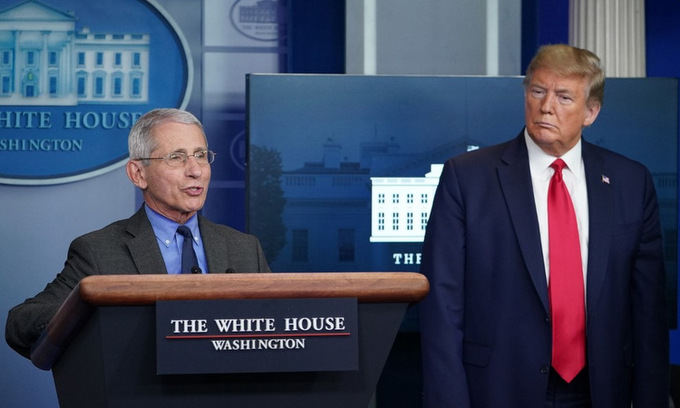 |
| Fauci (left) and Trump in the White House's meeting on April 13 (Photo: AFP) |
Some think Trump may have been testing the waters when he posted the retweet on Sunday night. Notably, Fauci has been absent from some White House briefings.
Zeke Emanuel, a special adviser on healthcare for the Office of Management and Budget in the Obama administration, told the Guardian on Monday Fauci was an “incorruptible man who follows the data”.
“[He] understands public health,” Emanuel said. “I mean, he’s a unique character, very unique. He never says what he doesn’t know.”
Emanuel added that during the coronavirus crisis, “the public has faith in [Fauci] and his view is critical”.
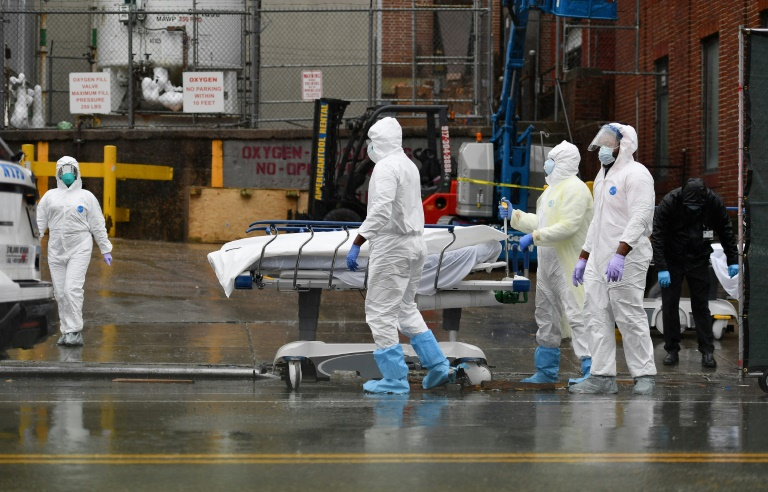 | The top infectious disease expert said the US probably reopens in May AFP informed that he United States may be ready to start gradually reopening next month, the government's top infectious diseases expert said on Sunday, as ... |
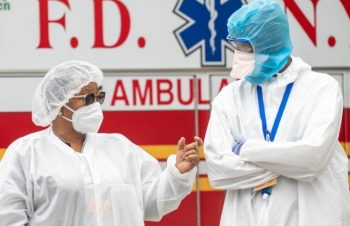 | Coronavirus update: U.S is world’s biggest epicenter, Canada’s infections approaching 24,400. Coronavirus updates today April 13 sees the US put at No.1 worldwide as the worst-hit country by COVID-19. Meanwhile, Canada ranked 13 on the list, ... |
 | Tiger detected positive for coronavirus in the US, raising queries about transmission in animals A tiger at the Bronx Zoo has tested positive for the new coronavirus, in what is believed to be the first known infection in an ... |
Recommended
 World
World
Pakistan NCRC report explores emerging child rights issues
 World
World
"India has right to defend herself against terror," says German Foreign Minister, endorses Op Sindoor
 World
World
‘We stand with India’: Japan, UAE back New Delhi over its global outreach against terror
 World
World
'Action Was Entirely Justifiable': Former US NSA John Bolton Backs India's Right After Pahalgam Attack
Popular article
 World
World
US, China Conclude Trade Talks with Positive Outcome
 World
World
Nifty, Sensex jumped more than 2% in opening as India-Pakistan tensions ease
 World
World
Easing of US-China Tariffs: Markets React Positively, Experts Remain Cautious
 World
World



